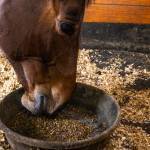Back Problems Common in Ridden Horses

Back pain in horses may be more common than their owners or caregivers think, according to a survey and evaluation conducted by researchers from French and Canadian universities. The researchers queried staff members who cared for horses at 17 riding schools in France about back health in a total of 161 horses. The caregivers reported that 19 horses, about 12%, had some pain in their backs.
Some of the horses (n=59) were then examined by a chiropractor with many years of equine experience. Others (n=102) were assessed by static surface electromyography, a technique that measures electrical activity of skeletal muscles. Certain detected patterns of activity can point to biomechanical problems. Results of these examinations indicated that 80 horses—half of the group—were suffering from some back disorder that might cause pain.
The researchers suggested that evaluations by most caregivers were not extremely accurate in judging whether or not a particular horse had back problems or discomfort. However, they also conceded that even trained professionals sometimes have difficulty in diagnosing back problems because horses may not indicate discomfort even though they feel pain.
Some horses that are uncomfortable will adopt characteristic postures that may not be recognized as a reaction to pain. Other horses may become unwilling to work or show avoidance or aggression toward handlers, especially when they are saddled or ridden, and this pain-related behavior is not always linked to discomfort by handlers. If the behavior is believed to stem from training flaws or the horse’s uncooperative attitude, pain may not be considered as a cause and the horse may be disciplined and kept in work instead of having its discomfort treated. Without rest or therapy, equine back problems could easily become worse.
Another complicating factor is locating the source of what seems to be back pain. Horses with lameness, gastric ulcers, and muscular soreness might be misdiagnosed with back problems while the true cause of pain is overlooked.
Conclusions from the study indicated that caregivers might benefit from training that would make them aware of subtle behavioral and postural signs of back problems in horses. Some studies indicate that at least a quarter of ridden horses may suffer from back disorders, and better-trained owners and managers might be able to detect problems in an early stage when they could be treated most easily.








